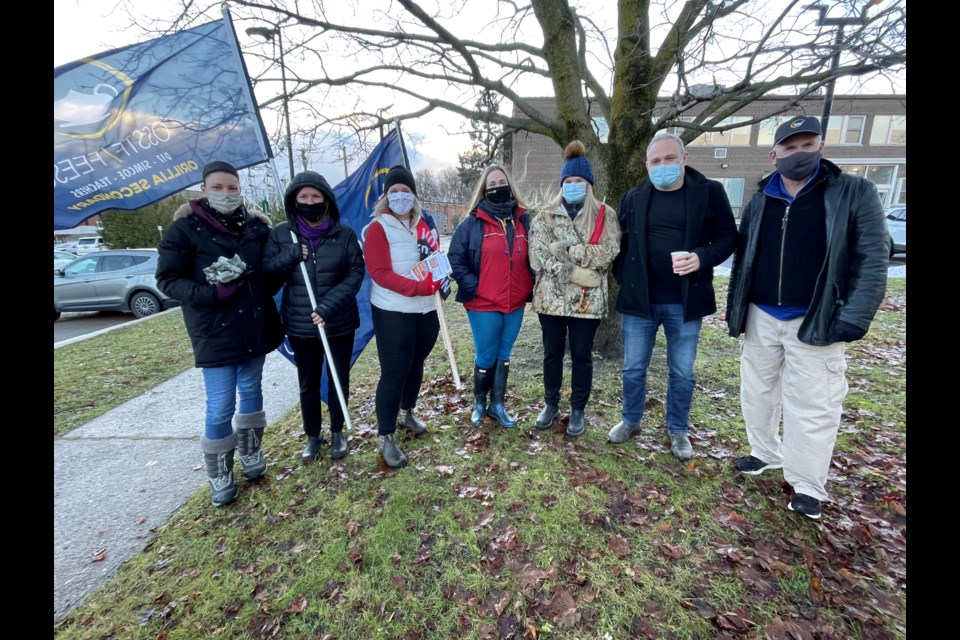A handful of teachers from Orillia Secondary School (OSS) and Twin Lakes Secondary School (TLSS) gathered today just outside Simcoe North MPP Jill Dunlop’s office on Coldwater Road to protest hybrid learning.
“We are here to raise some awareness about hybrid learning in Simcoe County. We have students who are tuning into a face-to-face classroom for their learning, so the teachers have to split their time between the kids in the classroom and the kids online,” explained Jen Hare, the Ontario Secondary School Teachers' Federation (OSSTF) District 17 bargaining unit president.
“We feel like the provincial government, along with the school board, need to provide the best learning for students at this time," Hare told OrilliaMatters. "There have been issues during the pandemic where kids felt they weren’t getting the information or skills they need. So, we need to give kids the best opportunity to learn and the best way to do that is a dedicated teacher or a virtual school where a teacher can be one on one with their students as opposed to splitting their attention.”
A similar protest also happened yesterday in Barrie, Hare noted.
“Our community partners, groups, and parents stopped by to wish us well, and we are here today to continue raising awareness because I don’t think many people know this is happening in our schools,” she said.
“The problem with this kind of fractured learning is it doesn’t just affect the kids learning at home, it affects those in the classroom as well because the teacher constantly has to go back and fourth between the two platforms.”
Sue Bolger, an English teacher at OSS, says she feels strongly about hybrid learning, explaining it doesn't do teachers or students any favours.
“We have students who need academic support, we have students who don’t have the technology, we have students with parents who don’t have the literacy levels to help them at home. All of these students need engagement at all times; we need to have the ability to engage them,” she said.
“When they are in the classroom you have the ability to see if they are engaged when they are sitting in front of you, you can see it on their face if they aren’t getting it or if they are distracted, you can very easily refocus a student," Bolger explained.
"But when they are at home and all you can see is a little icon, you have no idea what’s happening, if they are understanding, if they need more time with the material. And when you are trying to teach the students at home, you are losing the attention of the students in the classroom which isn’t fair to anyone.”
Bolger says e-learning works, learning in the classroom works even better, but both together is "completely ineffective."
Retired Park Street Collegiate Institute teacher John Winchester showed up at the protest to support his former colleagues who now work at OSS.
“My daughter is in high school, so I have an immediate concern about hybrid learning. I also continue to coach and officiate in the high schools, so I still have a lot of connections to school,” he explained.
Winchester says online learning did work for his daughter who was in Grade 10 last fall.
“There was a dedicated teacher for if she had a concern, the teacher wasn’t trying to teach the students in the classroom as well as deal with the kids online. Now, it’s a very different thing for teachers who have to focus on 30 kids in the classroom and teach online. You just can’t do either thing very well when your attention is split,” he said.
“The students online are going to get short-changed. If I had 30 kids in front of me and 12 online, I wouldn’t be telling the 30 kids that I’m going to be with the other 12 for half the time," he said.
Winchester says if he were still teaching and using the hybrid learning format, he would not be capable of doing his job at a high level.
Hybrid learning, which combines both online and in-school options, was introduced in February 2021 in the region, but with classes stopping because of rising COVID-19 cases at the time, the model only lasted until about April.
This academic year, starting in September, hybrid learning is happening in Simcoe County District School Board secondary schools.
"There are a few circumstances where hybrid learning is occurring, for example if a class is excluded and students are required to self-isolate as a result of COVID-19, but for the most part students who are learning remotely are taking e-learning courses," said board spokesperson Sarah Kekewich.
